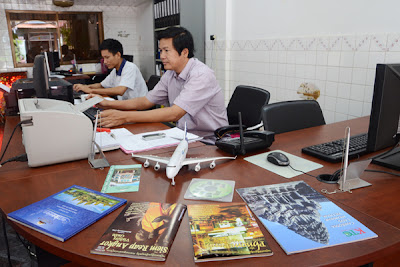By Dara Saoyuth
PHNOM PENH, Thursday 19 August 2010 (AFP) - Standing in front of a school in Cambodia's capital Phnom Penh, Than Vichea read out answers over his mobile telephone to his sister who was taking national exams inside.
He was not alone. Even the police deployed outside schools to stop relatives providing answers to the more than 100,000 students who sat the tests last month could not prevent cheating in many of the exam centres.
"What would happen if they fail?" asked Than Vichea. "We have to think about our expenses for schooling, part-time studies and fuel costs, and especially our time."
Several students interviewed by AFP said they had bribed teachers to allow them to check notes they had smuggled into the exams, or answer sheets allegedly sold in advance by teachers outside the schools.
One said he had paid about 30 dollars to teachers during two and a half days of exams so they would turn a blind eye to cheating and keep watch for school inspectors.
Others said they had bribed teachers to allow them to use their mobiles to phone relatives for help during the exams, the results of which will be announced on August 20.
"Besides copying answers from each other, candidates in my room could even make a phone call outside during the exams to get answers," said a female student who asked to remain anonymous.
"And when there was only one correct answer sheet, it was hard to pass from one to another. So those who use modern phones took a photo of that sheet and then sent it to each other via the Internet on their phones," she said.
After decades of civil war and the mass killing of educated people and intellectuals by the communist Khmer Rouge regime in the late 1970s, Cambodia is trying to restore its educational system. But it is a slow process.
"Our country was severely destroyed during the Khmer Rouge, so, as a child, we have started rebuilding," said Mak Vann, a senior official with the Ministry of Education.
"We have trained more teachers and up to now it's still not enough. We still lack educational tools, and more teachers need to be trained as well."
Cambodia's schools were obliterated under Khmer Rouge rule. The regime killed nearly two million people -- including many teachers -- as it emptied cities in its bid to forge a Communist utopia.
School buildings, documents and other educational resources were destroyed.
More than three decades later, a lack of infrastructure, human resources and educational tools, as well as low wages for teachers, are hindering efforts to improve standards in schools.
Not all students interviewed said there had been cheating in their exam rooms.
"In my room, it was very strict. We could not even look at each other during the exams. No cellphones were allowed," said one, Bun Keo Voleak.
But the apparent acceptance of bribes by many teachers reflects rampant corruption in general in Cambodia that is seen by many as a growing barrier to quality in human resources for the Southeast Asian nation.
Cheating and paying bribes are common during exams, but Rong Chhun, head of the Cambodian Independent Teachers Association, said the problem appeared to have worsened this year.
"Weakness in the educational system cannot help our country to develop," he said.
Cambodia was ranked 158th out of 180 countries in anti-graft organisation Transparency International's index of perceived public sector corruption in 2009.
It was also ranked the second most corrupt Southeast Asian nation after Indonesia in an annual poll by the Political and Economic Risk Consultancy.
"Corruption exists and sometimes it seems to be open, such as teachers collecting money from students even in public class," said In Samrithy, executive director of NGO Education Partnership.
He said Cambodia was lagging behind neighbouring countries in terms of the quality of education.
"Allowing students to cheat is dangerous for their future because what they write for their teachers is not their real knowledge, so when they face a real situation, especially in a competitive job market, they will have problems."



























